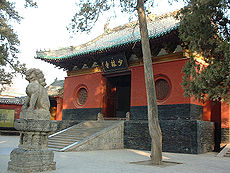- Zui Quan
-
Part of the series on
Chinese martial artsList of Chinese martial arts Terms Historical places - Shaolin Monastery (少林寺)
- Wudang Mountains (武當山)
- Mount Hua (華山)
- Mount Emei (峨嵋山)
- Kunlun Mountains (崑崙山)
Historical people - Five Elders (五祖)
- Yim Wing-chun / Yan Yongchun (嚴詠春)
- Hung Hei-gun / Hong Xiguan (洪熙官)
- Fong Sai-yuk / Fang Shiyu (方世玉)
- Dong Haichuan (董海川)
- Yang Lu-ch'an (楊露禪)
- Wu Quanyou (吳全佑)
- Ten Tigers of Canton (廣東十虎)
- Chen Fake (陳發科)
- Chan Heung / Chen Xiang (陳享)
- Wong Fei-hung / Huang Feihong (黃飛鴻)
- Sun Lu-t'ang (孫祿堂)
- Huo Yuanjia (霍元甲)
- Yip Man / Ye Wen (葉問)
- Wang Zi-Ping (王子平)
- Bruce Lee / Li Xiaolong (李小龍)
- Jackie Chan / Cheng Long (成龍)
- Sammo Hung / Hong Jinbao (洪金寶)
- Yuen Biao / Yuán Biāo (元彪)
- Jet Li / Li Lian Jie (李連杰)
- Donnie Yen / Zhēn Zǐdān (甄子丹)
Legendary figures - Bodhidharma / Putidamo / Damo (菩提達摩)
- Zhang Sanfeng (張三丰)
- Eight immortals (八仙)
Related Zui Quan (Traditional and Simplified Chinese: 醉拳; pinyin: Zuì Quán) is literally Drunken Fist, also known as Drunken Boxing or Drunkard's Boxing) is a concept in traditional Chinese martial arts, as well as a classification of modern Wushu forms. Zui Quan is sometimes called Zuijiuquan (Chinese: 醉酒拳; pinyin: zhìjiǔquán, literally "Drunken Alcohol Fist").
Contents
Concept
Zui Quan is a category of techniques, forms and fighting philosophy that appear to imitate a drunkard's movements.[1] The postures are created by momentum and weight of the body, and imitation is generally through staggering and certain type of fluidity in the movements. It is considered to be among the most difficult wushu styles to learn due to the need for powerful joints and fingers. While in fiction practitioners of Zui Quan are often portrayed as being actually intoxicated, Zui Quan techniques are highly acrobatic and skilled and require a great degree of balance and coordination, such that any person attempting to perform any Zui Quan techniques while intoxicated would be likely to injure themselves.[2]
Style
Even though the style seems irregular and off balance it takes the utmost balance to be successful. To excel one must be relaxed and flow with ease from technique to technique. Swaying, drinking, and falling are used to throw off opponents. When the opponent thinks the drunken boxer is vulnerable he is usually well balanced and ready to strike. When swigging a wine cup the practitioner is really practicing grabbing and striking techniques. The waist movements trick opponents into attacking sometimes even falling over. Falls can be used to avoid attacks but also to pin attackers to the ground while vital points are targeted.[3]
Zui Quan within Chinese martial arts
Many traditional Chinese martial arts utilize drunken techniques and fighting philosophy within forms and techniques. For example:
- Some lineages of Choi Lei Fut contain "drunken" forms. Choi Lei Fut drunken technique teaches feints, explosive power generation, swaying motions and various other distraction techniques.[4][5]
- Monkey Kung Fu contains a variation of monkey style called "Drunken Monkey" which involves "a lot of throat, eye and groin strikes as well as tumbling and falling techniques. It incorporates a lot of false steps to give the appearance of defenseless and uses a lot of off-balance strikes. The practitioner waddles, takes very faltering steps and sometimes fall to the ground and lies prone while waiting the opponent to approach at which time a devastating attack is launched at the knees or groin areas of the opponent."[citation needed]
- Performance Wushu contains several exhibition forms known as "drunken" forms, but which bear no actual connection to the forms found in traditional Chinese martial arts.[2]
- Most lineages of Hung Gar and Hung Fut contain drunken forms.
Zui Quan in mixed and non-Chinese styles
Shaolin-Do teaches drunken forms beginning at the first degree blackbelt level.[6]
Media appearances
Main article: Zui Quan in popular cultureZui Quan received mainstream media attention outside of China after the premiere of the Jackie Chan film Drunken Master in 1978. There are sequels. Drunken Fist's legendary style and execution is featured in many books, movies, comics, games and television shows.
References
- ^ "Six Shaolin Boxing Styles". Shaolin International Federation. http://www.shaolin.nl/_indexe205.html?ID=22. Retrieved 2008-04-02.
- ^ a b "Drunken Kung Fu". Kung Fu Tai Chi Magazine. http://ezine.kungfumagazine.com/ezine/article.php?article=550. Retrieved 2008-04-07.
- ^ http://www.kungfumagazine.com/ezine/article.php?article=550
- ^ "Choi Lei Fut Drunken Form". The Martialarm.com. http://www.martialarm.com/martial-articles/The_Rare_Drunken_Form_of_Choy_Lay_Fut_Kung_Fu.html. Retrieved 2008-04-07.
- ^ "Choi Lei Fut Drunken Boxing". Flying Eagle Martial Arts. http://flyingeagleacademy.com/drunken.html. Retrieved 2008-04-07.
- ^ "Shaolin-Do Forms". Austin Shaolin Do. http://www.austinkungfu.com/about_adult_forms.asp. Retrieved 2008-04-02.
External links
Categories:- Chinese martial arts
- Contemporary wushu
- Chinese martial arts terms
Wikimedia Foundation. 2010.

